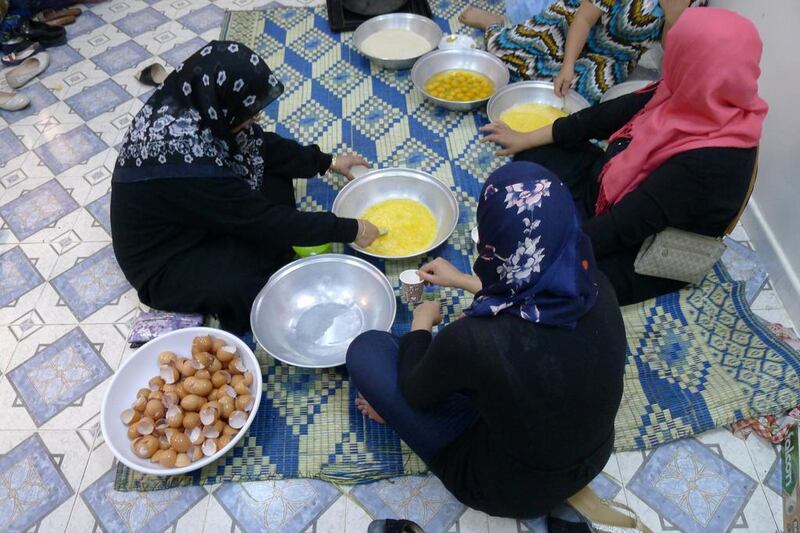A smell of frying onions fills the air as women in colourful dresses and headscarves bustle through the six-room, part-finished villa that has been transformed into a large sprawling kitchen. For the women of Libya’s third city of Misrata, it is another day of preparing savoury dishes, snacks and sweets for the thousands of men battling against ISIL militants on the frontline in Sirte.
“Today we are making ghraiba – meat-filled dumplings – and we have already finished three big trays,” Fatima Mohamed says.
“I lose count of the number of eggs I use every day.”
To prepare 800 dumplings, 12 women sit in groups of three or four, each part of a makeshift factory line of traditional hand-prepared Libyan cuisine.
“Today it’s ghraiba but yesterday we made stuffed vine leaves. Every day we make something different,” she says. “Each night when we pack up, we decide what we will make the next day. We have a stock of favourite recipes we regularly use and, because we are making so many, we just times the ingredients by 50.”
The group usually makes three or four different items each day. Outside, Naima is stirring a huge vat of pizza sauce – containing two crates of freshly-chopped tomatoes. “We will make over 1,000 pizzas today, because they are very popular,” she says.
Many of the women have sons, brothers or fathers on the frontline, like 13 year-old Safa, whose father, uncles and cousins are all fighting in Sirte. With ISIL fiercely defending its occupied territory there with snipers, suicide bombers and mortars, the men are wounded most days. More than 200 have been killed and more than 1,000 injured in two months of fighting.
“We cry every day, but it is good to come here and cook for our sons, it is not a chore,” says Khadija Al Khshaym.
Two of Khadija Mahella’s sons – both of whom were injured in previous conflicts – are fighting on the frontlines.
“Both my boys are in Sirte and I haven’t seen them for weeks. One of them shouldn’t even be fighting,” she says, explaining that an operation to replace his shattered hip after an injury in 2011 was only partially successful and often gets infected, so he needs to go abroad for further treatment.
Despite this, she is positive about the fight in Sirte. “I feel good because Allah is great and this is a war against infidels,” she says. “If this was Muslims fighting each other, I would be upset, but Daesh are not Muslims.”
Although Sirte is 240 kilometres away, the horrors of war are close – in the city’s hospitals, caring for injured sons at home, and the posts on social media. One woman whispers that her nephew was one of three young men from Misrata captured by ISIL. “We know he was alive when they took him because his brother was there, but later Daesh tortured him, taking all the skin off his face and killed him,” she says, her voice breaking. “Daesh took pictures and posted them on Facebook. He was just 20 years old.”
Despite the barbarity of war, there is companionship. The cooking is a distraction from grief and anxiety. “We are like a hive of bees here, always busy, which is good, because if you don’t give people something to do, they get upset,” says Zachriya Mohamed Ibrahim, preparing a protein drink, hawera. “They just need to add water, shake it up and its ready to drink.”
The villa is the largest of four other makeshift kitchens in Misrata, preparing food for the fighters. About 100 women meet every morning and night, in five-hour shifts. The youngest volunteer is 11, the oldest 85 and for most, this is the only way they can support the war effort.
“We can’t go and fight with weapons but our faith is our weapon,” says Fatima Mohammed. “And so we sing takbeer when we cook, to help bring our sons victory.”
Many women have cooked with the group since 2011, a sad testimony to the series of civil conflicts which have defined post-Muammar Qaddafi Libya. “When there is no fighting, we relax in our homes but as soon as there is fighting, we come here and start cooking,” says Aisha Amran.
The fighters battling ISIL militants in Sirte are operating under Libya’s UN-backed government but they still lack material and financial support. The forces are funded mainly by businessmen from Misrata, from where many fighters originate. Most of the provisions the women cook with are also provided by these businessmen and local people.
In the pantry – the only air-conditioned room – there are crates of finished sweets and biscuits waiting to be collected and taken for distribution on the frontline. “We always make a lot of sweets because our men love them,” says Narjes Zarmauh, one of the organisers.
She holds up a tray of the Middle Eastern syrup-infused cake basbousa, which has a thin strip of paper taped across it with a message written in Arabic – lyrics from a famous song.
“We often put poems, messages, song lyrics and prayers in with the food so the men know we are thinking of them and supporting them. It helps to lift their spirits and keep them resilient and resolved in the fight,” she says. “We are told that the notes are one of their favourite things and sometimes they compare the messages they each get.”
The sweetmeats are made in batches of 700 to 1,000 but on days after battles with heavy losses, the women put in extra hours to make up to 4,000 cakes. “Today we are making Greek doughnuts, which are laden with syrup,” says Fatima Mohamed, hands deep in dough. “We are planning to make around 5,000 because they are very popular and we are sure every man will want more than one.”
Tom Westcott is a freelance journalist based in North Africa.





